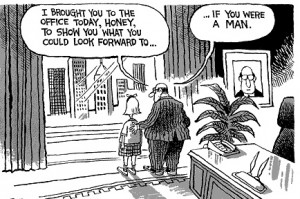Jessica Valenti wriites: Feminists insist that the more women, people of color and LGBT individuals are visible, the better off – and more egalitarian – the world will be. But is simple representation the best answer to sexism?
Women are still scarce in many places of power.
The push for eventual parity, however, often means that the first women in traditionally male spaces – be it politics, gaming or even firefighting – are saddled with the responsibility of taking abuse until a critical mass is reached and (hopefully) the culture shifts, and of making that space more woman-friendly.
Women still make up barely 24 per cent off all legislators nationwide,.
It is unclear if women’s presence in Congress has had much impact on the behavior of their male colleangues (or the continually sexist culture in politics).
We simply don’t have enough women represented yet to know what a critical mass might do. The fact that we’re still counting women is because there’s not that many of them.
“You’re still looking at an institution that is overwhelmingly male; it’s still the most exclusive men’s club in the world”, she said.
Any person breaking in to a space where they’re not of the dominant culture – it’s hard.
Asking individual women to enter hostile spaces to make them better is really asking women to make men better – and to make men better at women’s own risk. But it shouldn’t be women’s responsibility to fix men or deal with their misogyny. Instead, men should be taking it upon themselves to treat women with respect, and demand their other male colleagues do the samen
We need to regularly ask underrepresented folks: what would support look like to you? And then develop concrete, ongoing systems to provide that support.
That means if a female politicians want more bathrooms, get them more bathrooms and lay off the potty jokes. It also means developing support and training for non-traditional jobs for women and demanding that straight white men do as much to make spaces friendly for underrepresented groups as those groups themselves. Women – and women’s presence – aren’t the only things that can end sexism, and closing gender gaps is more than just a number’s game. So let’s look forward to the day we can stop counting.

